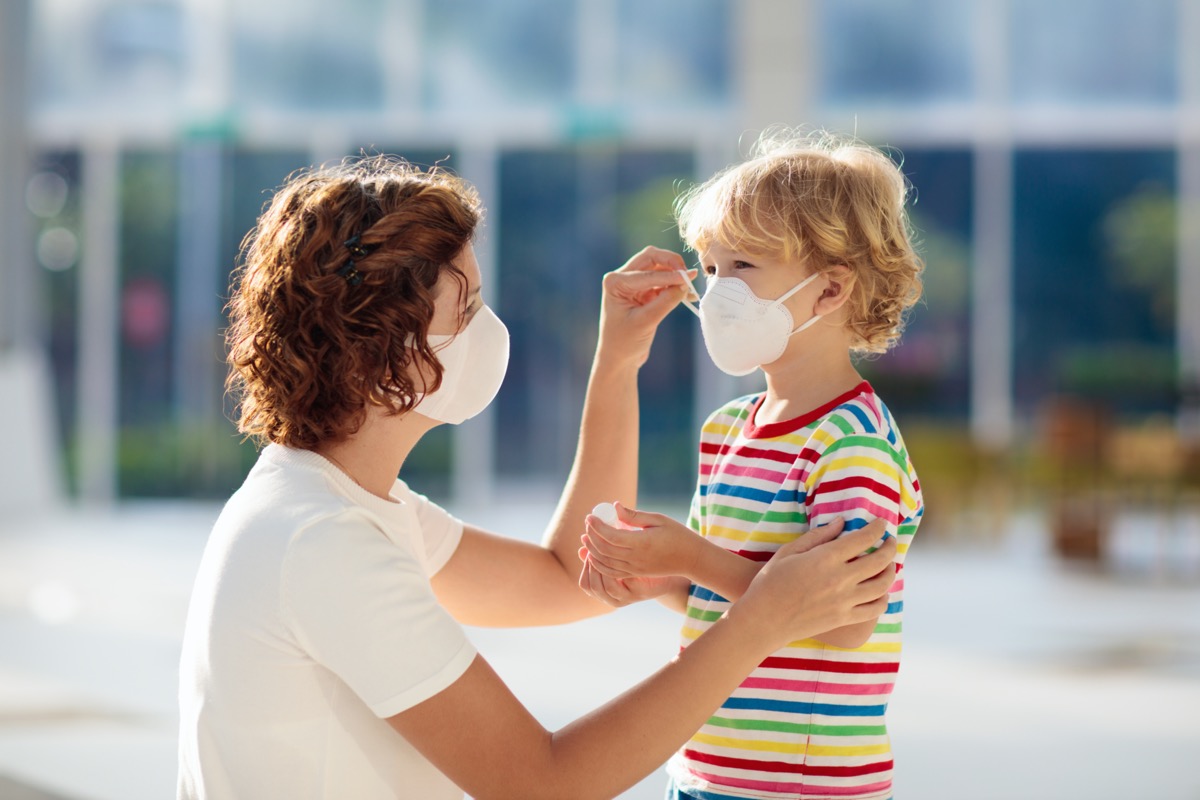These Are the New Coronavirus Warning Signs in Children

One of the few aspects of COVID-19 that has provided some small relief has been that it does not seem to seriously affect children who catch it. And while it remains extremely rare for a child to be impacted by the virus, there has been a recent rise in an alarming condition believed to be a reaction to the coronavirus. Hospitals have begun reporting cases of children suffering an inflammation of blood vessels, limiting blood flow to the heart and other organs. Called multisystem inflammatory syndrome in children, or MIS-C, it appears to be a complication resulting from COVID-19 infection and can cause serious organ damage without rapid treatment.
MIS-C is the body’s reaction to COVID-19, rather than the coronavirus itself, so it does not show up as the classic indicators of coronavirus we’ve learned to watch out for in adults (dry cough, fever, exhaustion, etc.). During the CDC’s Clinician Outreach and Communication Activity briefing on May 19, speakers pointed out that there is a delay of about two to six weeks between initial COVID-19 infection and the onset of MIS.
Many of the children who have developed MIS-C had been perfectly healthy before showing symptoms of MIS. They tested negative for COVID-19 and never displayed the typical symptoms of the disease. But, many tested positive for the antibody test, suggesting they had contracted COVID-19 previously. (Related: 3 Precautions to Take as Your City Reopens—Depending on Your Age.)
So, what are the symptoms of MIS-C?
The symptoms of MIS-C vary from one case to another, but according to the team of experts the CDC assembled, they can include:
- Abdominal pain
- Persistent fever for more than a couple days
- Vomiting
- Diarrhea
- Rash
- Red, cracked lips
- Red eyes (aka conjunctivitis or conjunctiva injection)
- Swollen feet or hands
- Swollen lymph nodes on one or both sides of the neck
Many of these symptoms and the resulting inflammation of arteries are similar to Kawasaki disease, which also causes swelling of the arteries and primarily affects children. But the children affected by MIS-C tend to be older and more likely to require critical care than those who contract Kawasaki. Michael Levin, professor of pediatrics and international child health at Imperial College during the briefing described the children whom he treated ranging in age from one to 16, with a median age of 11, and 62 percent of them were male.
Whether their children are suffering from Kawasaki disease or MIS-C, their parents should seek treatment for them immediately.
“I would think that any child at home who has a persistent fever, abdominal pain or abdominal symptoms, as well as a rash or conjunctivitis eyes, they should be seen by a pediatrician right away,” said James Schneider, chief of pediatric critical care medicine at Cohen Children’s Medical Center, during the briefing. “And I think, as a pediatrician evaluates a child, if there are any signs or symptoms of Kawasaki disease, the child should be referred for additional evaluation and a cardiologist needs to see this child.”
Parents should keep in mind a few points:
- MIS-C is extremely rare. As scary as the symptoms are and as serious as they should be taken, the chances a child is suffering from MIS-C is remote, with fewer than 200 cases reported throughout the U.S. so far. Even more rare is for death to result from MIS-C.
- These symptoms could be caused by many other conditions. Just as a cough could indicate many other health issues than COVID-19, a child displaying the above symptoms could be dealing with any number of other conditions. Vomiting could be due to a typical stomach flu. A rash and swollen lymph nodes could be caused by strep throat. Let a medical professional determine if it’s MIS-C.
- It can be treated. Blood tests can quickly tell doctors if children are experiencing MIS-C and tests are able to assess if there is any heart damage or inflammation that need medical treatment. While Levin notes that some of the patients he saw, “took quite a considerable amount of time to come out of intensive care,” that “the majority of patients responded quickly to treatment.”
- There is a lot that researchers still don’t know. Researchers are rapidly moving to better understand MIS and how best to treat it, with several multinational studies underway. “Do anti-inflammatory drugs and immunomodulators such as immunoglobulins, steroids, anti-TNF, anti-IL1, and so on, improve the outcome and reduce the risk of coronary artery aneurysms?” Levin asked during his presentation. “What are the mechanisms? And are there biomarkers which distinguish each group from COVID and from other conditions? So those are the questions that we’ve been grappling with in the UK and really need to be addressed at a multinational level in order to pool resources.”
Parents have understandably been doing all that they can to avoid hospitals in the midst of stay-at-home orders and concerns to avoid exposure to COVID-19. But public health experts urge that if their children are exhibiting these symptoms, that parents get them medical attention right away, to start treatment before it progresses. To keep up with the latest coronavirus news, sign up for our newsletter and make sure to read the one way to get COVID-19 while grocery shopping, according to the latest CDC guidelines.








